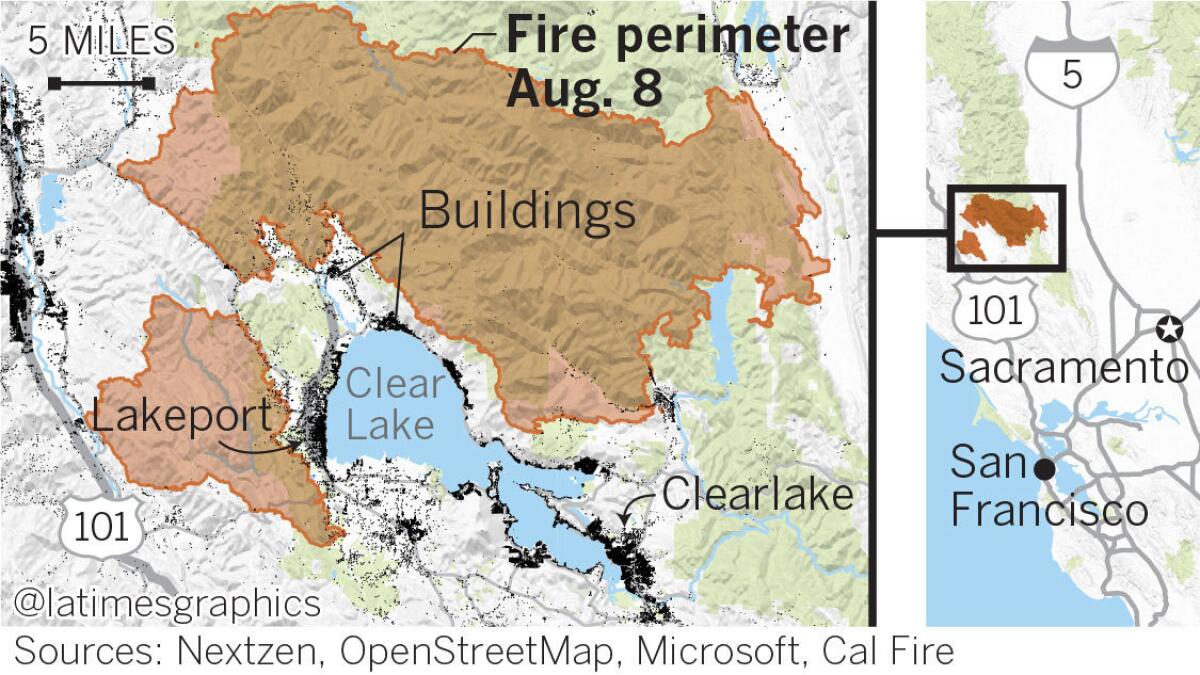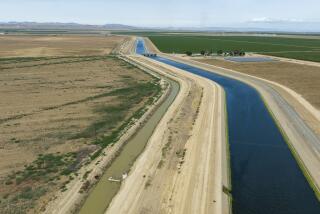Column: Trump’s minions are using California wildfires as excuse to attack endangered species protections
- Share via
Just two days after President Trump issued an utterly uninformed tweet about the causes of the California wildfires, his ulterior motives began to come into focus.
That happened through an order issued Wednesday by Commerce Secretary Wilbur Ross to the National Marine Fisheries Service and its parent agency, the National Oceanic and Atmospheric Administration. Both fall under Ross’ jurisdiction.
The order directs the agencies to “facilitate access to the water needed to fight the ongoing wildfires affecting the State of California.” It then gives the game away by making specific reference to the federal Endangered Species Act: “Consistent with the emergency consultation provisions under the ESA, Federal agencies may use any water as necessary to protect life and property in the affected areas,” the order says.
Secretary Ross’s directive is nothing more than a smokescreen designed to weaken these protections ... necessary to keep these native fish from going extinct.
— Kate Poole, NRDC
Environmental experts aren’t buying Ross’ statement.
“Secretary Ross’s directive is nothing more than a smokescreen designed to weaken these protections that NMFS’s scientists determined are necessary to keep these native fish from going extinct,” Kate Poole of the Natural Resources Defense Council said after the statement was issued. “It’s almost like the extinction of these creatures is their real goal, so that they no longer have to leave any water in rivers, but can divert it all to corporate agribusiness.”
Here’s the context: Trump on Monday issued what we called a “strikingly ignorant” tweet blaming the wildfires on “bad environmental laws which aren’t allowing massive amount of readily available water to be properly utilized.” We observed that this seemed to conflate two issues.
One is the long-term whining by growers in the Central Valley, a Republican stronghold, that environmental rules (including the Endangered Species Act) have forced the diversion of water they want for irrigation into rivers. The river flows are needed to protect fish and fisheries, and are required under federal law and in accordance with court rulings.
The other issue is water for fighting the wildfires. As numerous expert sources have made plain, there is no shortage of water for this purpose. Major reservoirs are fully accessible to the fire zones and they’re at or near historical capacities.
“At this point, water supply hasn’t affected any of our operations,” Mike Mohler, deputy director of the California Department of Forestry and Fire Protection, or Cal Fire, told me Wednesday. The key factors in the intensity and spread of the fires are, as before, “hot and dry weather conditions.”
Ross’ statement made specific mention of the Mendocino Complex fire, which he noted “has developed into the largest in the state’s history, consuming nearly 300,000 acres in Northern California.” But the Mendocino Complex fire is immediately adjacent to Clear Lake, a major reservoir. Mohler said firefighters have been drawing water from Clear Lake without any limitations.

The Commerce Department didn’t immediately respond to my inquiry about what Ross has in mind, or what actions could be taken by NOAA and the fisheries service to respond to the current emergency. But Ross’ reference to the Endangered Species Act strongly suggests that he intends to bootstrap the wildfires into serving the administration’s existing efforts to undermine the act for the benefit of its cronies in Central Valley agriculture.
It’s also plausible that the federal government is trying to circumvent regulations governing the storage of water in the federally controlled Shasta Lake, the state’s largest reservoir. The rules are designed to protect salmon smolt in the Sacramento River, more than 95% of which were destroyed in 2014 and 2015 by releases of water that was too warm for them to survive.
Regulations put in place after that disaster required water to be held in storage to the end of the year, so more cold water is available for the young salmon. But that reduces the water available for irrigation during the fall. Conceivably, Ross’ order could allow the reservoir to release water now — a boon to farmers, but a calamity for the salmon fishery. Importantly, releasing water now would do nothing to assist firefighters.
As we’ve reported, the Bureau of Reclamation, an Interior Department agency, has proposed changes in both state and federal water projects to “maximize water deliveries” to non-environmental users and consider “modifications to regulatory requirements” established by the biological opinions.
Meanwhile, the Interior and Commerce departments have jointly proposed changes in the federal Endangered Species Act that would shrink the roster of species granted legal protections and loosen the rules protecting those that remain on the list.
Ross’ order certainly looks like a transparent attempt to expand that campaign. Ross hinted as much. His order not only directed NOAA to “facilitate the use of water for this emergency,” but stated that “going forward, the Department and NOAA are committed to finding new solutions to address threatened and endangered species in the context of the challenging water management situation in California.”
That certainly sounds like plans to shrink protections for threatened and endangered species by invoking all aspects of the “water management situation” in the state — including serving the growers. Anyone concerned with trying to fashion rational water policy in the face of politically self-interested interference out of Washington should take heed. The Trump administration just signaled that it will stop at nothing, no matter how illogical.
Keep up to date with Michael Hiltzik. Follow @hiltzikm on Twitter, see his Facebook page, or email [email protected].
Return to Michael Hiltzik’s blog.
UPDATES:
3:05 p.m.: This post has been updated with comments from Cal Fire and Kate Poole of the NRDC.
5:44 p.m.: This post has been updated with information about water releases from Lake Shasta.
More to Read
Sign up for Essential California
The most important California stories and recommendations in your inbox every morning.
You may occasionally receive promotional content from the Los Angeles Times.











